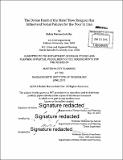The divine hand of the state? : how religion has influenced social policies for the poor in Iran
Author(s)
Manouchehrifar, Babak
DownloadFull printable version (7.586Mb)
Other Contributors
Massachusetts Institute of Technology. Engineering Systems Division.
Advisor
Bishwapriya Sanyal.
Terms of use
Metadata
Show full item recordAbstract
As a paramount concern in development planning, poverty alleviation encompasses a variety of agents and actions, depending on the larger context of organizations and political economy within which it is embedded. Iran has a distinctive constellation of religion, society, and politics. This thesis examines how religion has influenced the ways in which the poor have been helped in Iran since the formation of the (modem) nation-state in the 1870s. Religion has often been considered a monolithic institution that inherently supports or obstructs social policies for the poor. The notion of functional differentiation-and emancipation-of the state from the religious sphere constitutes the conventional understanding of how social policies are to be planned and implemented-a notion contrary to theocratic ideals. There exists a marked disparity between this secular understanding of social policy and the lived reality in many parts of the world, where such policies can generate resistance from their intended recipients, especially when they are considered to disrupt religious ties, imperil religious authority, and undermine traditional sources of social meaning. Therefore, how religion influences social relationships and how religious beliefs can help or hinder the formulating of social policies remain crucial issues. Religion in Iran has affected social policies in varied ways. First, as an organized set of beliefs, religion has invariably cultivated a moral-spiritual discourse to help the needy by motivating state officials who are in charge of social policies. Second, as an institution, religion has established, mediated, and unsettle relationships between the poor and the principal agents of poverty alleviation. Finally, as an instrument, religion has been used by the state to serve populist or security purposes. This thesis shows that if the 'guiding hand' of the state and the 'divine hand' of religious institutions are joined, the impact can be either regressive (particularly for religious minorities) or progressive, depending on a host of variables among which the central one is the historically produced power relationship between the two sets of dominant institutions. Herein lies a central dilemma for development planners: if modernization efforts do not take into account religious sentiments, which are a primary source of meaning for people, such efforts are bound to fail in the long term; and yet, if religious sentiments dominate state-making efforts, it can at best lead to 'charitable efforts' without deep constitutional groundings of the rights of the poor to state resources. Therefore, how to blend state policies and religious beliefs is a crucial issue if both religious extremism and state monopoly are to be avoided in crafting social policies.
Description
Thesis: M.C.P., Massachusetts Institute of Technology, Department of Urban Studies and Planning, 2015. Thesis: S.M., Massachusetts Institute of Technology, Engineering Systems Division, 2015. Cataloged from PDF version of thesis. Includes bibliographical references (pages 96-101).
Date issued
2015Department
Massachusetts Institute of Technology. Department of Urban Studies and Planning; Massachusetts Institute of Technology. Engineering Systems DivisionPublisher
Massachusetts Institute of Technology
Keywords
Urban Studies and Planning., Engineering Systems Division.